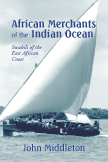
134 pages, $23.95 list
1-57766-314-4
978-1-57766-314-0
© 2004
paperback
eBook availability
African Merchants of the Indian Ocean
Swahili of the East African Coast
This new monograph serves as an authoritative introduction to an unusual people of eastern Africa known as Swahili. Middleton, who has known these people for a half a century, describes their highly stratified, merchant society and civilization, documenting their importance both for anthropologists and for others interested in Africa. Swahili continue today their centuries-old role as merchants in long-distance international trade, a role that has led them to form a society very distinct from any other in Africa. Middleton’s brief, personal treatment discusses Swahili recorded history as an integral part of their rich tradition and civilization. He clears up past confusions and mistaken assumptions without trying to define a single “Swahili” identity. His lucid approach unravels contradictions about Swahili being merchants and yet fishermen, who live in both cities as well as small villages, and who reckon various kinds of kinship and marriage. Swahili are often considered by non-Swahili as being both Africans and Arabs, but Middleton shows that they remain African despite having long adopted Islam and many aspects of Arab and Asian cultures.
Reactions
“This comprehensive and balanced account will provide a useful introduction to a complex and fascinating society for courses in anthropology and history as well as those on the Swahili langauge.” —International Journal of African Historical Studies
1. Why Swahili?
2. The Sea and the Land
3. The Shape of Swahili Society
4. Myth and History
5. The Outside World
6. Townspeople
7. Rank and Family
8. Production and Labor
9. Merchants
10. Marriage and Property
11. Purity and Honor
12. Religion and Custom
13. Women, Men, and Spirits
14. Swahili Voices
2. The Sea and the Land
3. The Shape of Swahili Society
4. Myth and History
5. The Outside World
6. Townspeople
7. Rank and Family
8. Production and Labor
9. Merchants
10. Marriage and Property
11. Purity and Honor
12. Religion and Custom
13. Women, Men, and Spirits
14. Swahili Voices